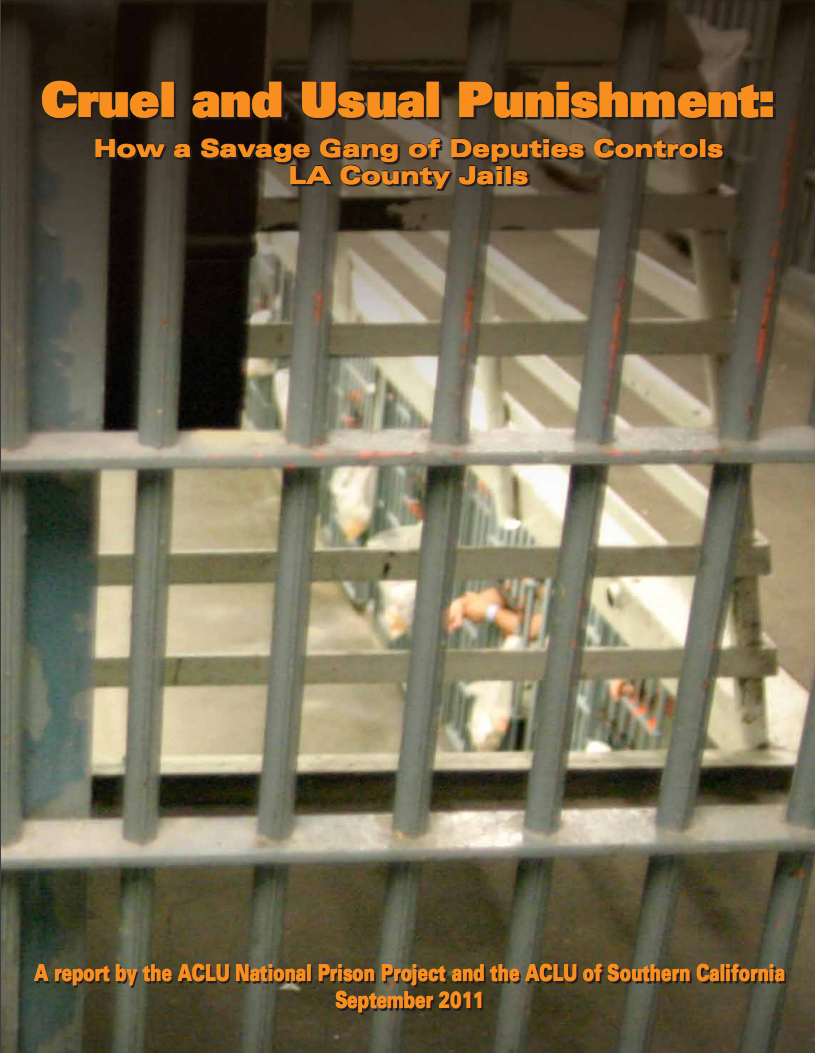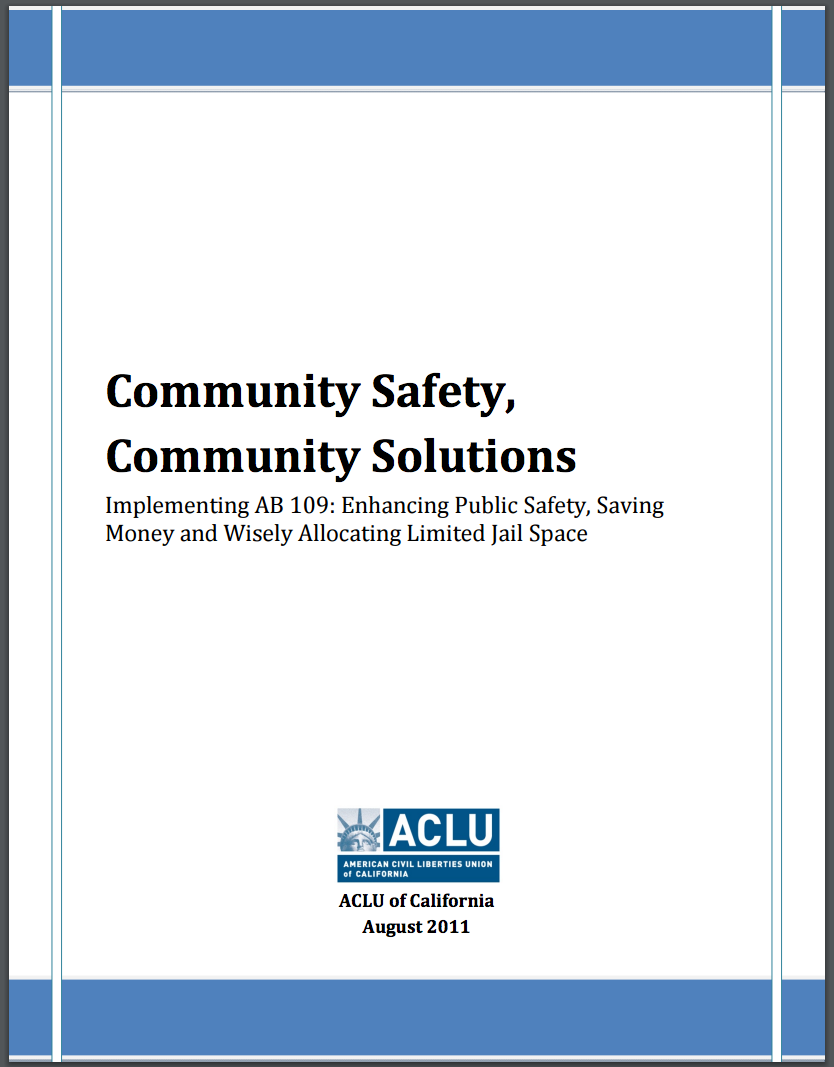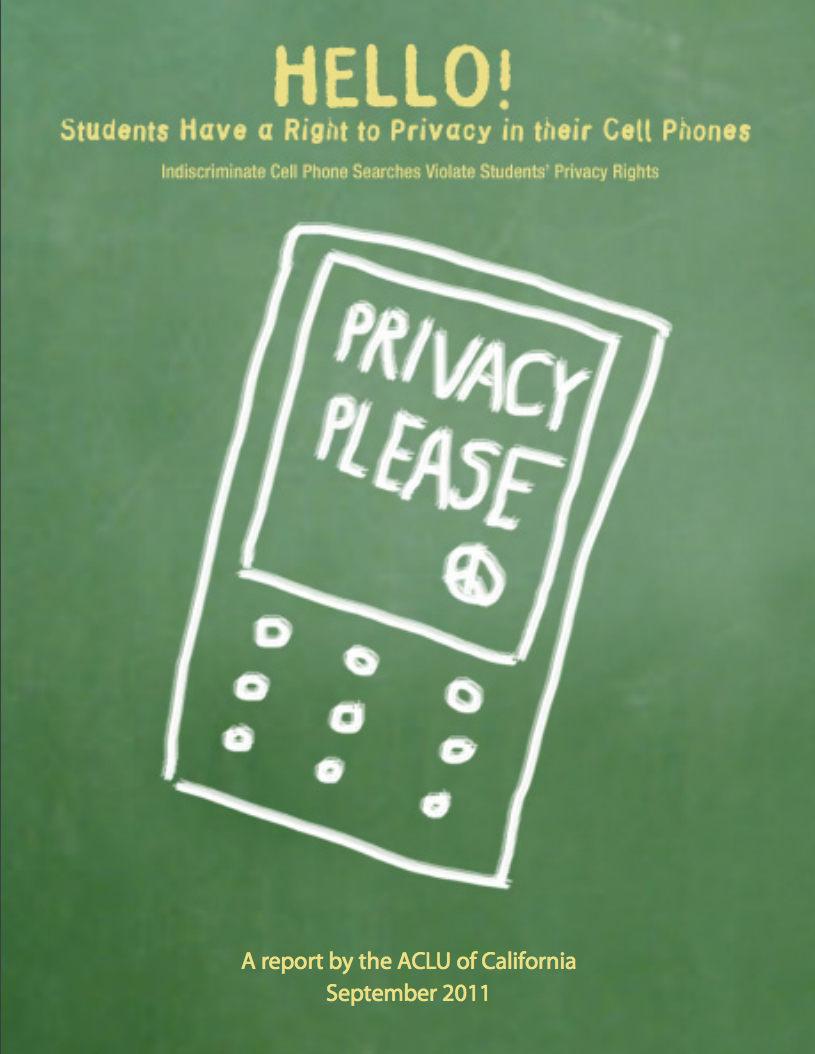To be an inmate in the Los Angeles County jails is to fear deputy attacks. In the past year, deputies have assaulted scores of non-resisting inmates, according to reports from jail chaplains, civilians, and inmates. Many attacks are unprovoked. Nearly all go unpunished: these acts of violence are covered up by a department that refuses to acknowledge the pervasiveness of deputy violence in the jail system.
Deputies act with such impunity that in the past year even civilians have begun coming forward with eyewitness accounts of deputies beating non-resisting inmates in the jails. These civilian accounts support the seventy inmate declarations describing deputy-on-inmate beatings and deputy-instigated inmate-on-inmate violence and deputy threats of assaults against inmates that the ACLU Foundation of Southern California (ACLU/SC) has collected in the past year, as well as the myriad inmate declarations the ACLU/SC has collected over the years.
“To this day, recalling the beating brings tears to my eyes, and I cannot finish talking about it without taking a few moments to compose myself.”
— Chaplain Paulino Juarez, describing a 2009 beating by deputies of an inmate in Men’s Central Jail.
“I was so shocked that despite the deputies seeing me watch them beat up the inmate, they continued to kick and beat him. It was like they didn’t even care that there was a witness”
— Chaplain Doe, describing a 2011 beating by deputies of an inmate in Men’s Central Jail.
“To an astonishing extent, unchecked violence, both deputy-on-inmate and inmate-upon-inmate, permeates Men’s Central Jail and Twin Towers jails, which are components of the Los Angeles County Jails, managed by the Los Angeles County Sheriff’s Department under the leadership of Sheriff Leroy Baca. … The voluminous evidence I have reviewed cries out for an independent, far-reaching, and in-depth investigation by the Federal Government. The problem can no longer be ignored.”
— Thomas Parker, former Assistant Special Agent in Charge of the FBI’s Los Angeles Field Office.
Date
Thursday, September 1, 2011 - 12:00am
Featured image
Show featured image
Hide banner image
Related issues
Police Practices
Documents
Show related content
Tweet Text
[node:title]
Type
Menu parent dynamic listing
Style
Standard with sidebar
California prisons face conditions so extreme that the U.S. Supreme Court has stepped in, ordering the state to take immediate steps to significantly reduce our prison population to comply with Constitutional standards.
The Problem: Over‐incarceration and High Recidivism
Today, the United States has 5% of the world’s population and 25% of the world’s incarcerated population. The state of California houses one of the largest prison and jail populations within the U.S. Despite extremely high state and local incarceration rates, California’s recidivism rate of 67.5% is among the highest in the nation. California prisons face conditions so extreme that the U.S. Supreme Court has stepped in, ordering the state to take immediate steps to significantly reduce our prison population to comply with Constitutional standards.
The Solution: County‐level, Evidence‐based Alternatives to Incarceration
Your county can be part of the solution. With the passage of AB 109 and subsequent amending legislation (“The 2011 Realignment Legislation Addressing Public Safety”), your county government assumes significant new corrections, reentry and community supervision responsibilities for people convicted of certain non-serious, non-violent felonies. Broadly speaking, realignment refers to changes in the assignment of program and fiscal responsibilities between the state and local governments. In the context of AB 109, realignment refers to the shifting of criminal justice responsibilities from the state prisons and parole board to local county officials and superior courts.
AB 109 realignment goes into effect on October 1, 2011. The state is providing funding to counties to offset some of the local costs realignment will bring. Each county is required to develop a realignment implementation plan, to be voted on by a seven-member committee of county officials and submitted to its Board of Supervisors. This Report will provide local government officials, service providers and the public with the information and tools needed to collaboratively develop successful realignment implementation plans.
Date
Monday, August 1, 2011 - 12:00am
Featured image
Show featured image
Hide banner image
Documents
Show related content
Tweet Text
[node:title]
Type
Menu parent dynamic listing
Style
Standard with sidebar
Indiscriminate cell phone searches threaten students' privacy rights in ways that have never before been possible. Sweeping searches threaten to expose a tremendous amount of private, personal information, and to teach our youth that such invasions of privacy are routine parts of civic life.
The right to privacy is one of our most basic and cherished constitutional rights. It protects us from unwarranted government intrusions into our personal affairs. As one of our most well known and highly respected U.S. Supreme Court justices put it nearly eighty years ago, the drafters of the Constitution “sought to protect Americans in their beliefs, their thoughts, their emotions and their sensations. They conferred, as against the government, the right to be let alone – the most comprehensive of rights and the right most valued by civilized men. To protect that right, every unjustifiable intrusion by the government upon the privacy of the individual, whatever the means employed, must be deemed a violation of the [Constitution]. ”
The American Civil Liberties Union (ACLU) has a long and proud history of defending the right to privacy. As technology has advanced, the law has often struggled to keep pace and ensure protection for personal information. As technology now provides new ways to gather information and databases containing personal information proliferate, the need for privacy protections becomes more urgent. The ACLU is a national leader in working to guarantee that individuals may determine how and when the government can gain access to their personal information.
The ACLU has protected employees in their personal electronic mail; patients in their medical records and, indeed, their very DNA; airline passengers in the face of intrusive and ineffective full body scans; internet users in their profiles, search histories and purchases; and cell phone users in their phone records and data. The ACLU also has long advocated to protect the privacy rights of public school students. Although it has long been established that students do not shed their constitutional rights at the schoolhouse gate, 2 students’ privacy rights have been under constant threat of erosion. The ACLU has been at the forefront of their defense, opposing such invasions of student privacy as electronic monitoring and tagging of jerseys and backpacks, the collection of student information in electronic databases to be shared with the federal government and military recruiters, random drug testing, and unreasonable surveillance.
This report addresses the intersection of technology and student rights – the searches and seizures of students’ cell phones.
Date
Thursday, September 1, 2011 - 12:00am
Featured image
Show featured image
Hide banner image
Related issues
Privacy and Surveillance
Education Equity
Documents
Show related content
Tweet Text
[node:title]
Type
Menu parent dynamic listing
Style
Standard with sidebar
Pages


